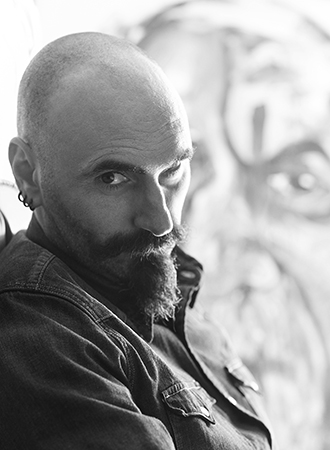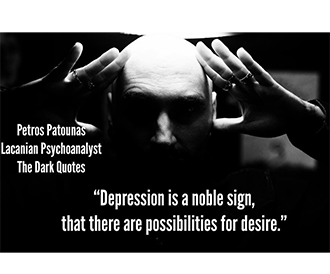The Act bankruptcies the equivalence of the subject and its signifiers- it is Alien to the discourse that is a semblance∙ what class of an antechamber in the adytum is the analysand’s verdict to accept, not to enter, analysis, and to refuse the replication for the sake of a metasis of its jouissance∙ and who, again, and who, and what genus of a place is the psychoanalytic session, notwithstanding its material coordinates, if not a place where there is no door or a gate- even more to ask is how the session is embodied, as what, in a given analytic culture drowned by the discourses of capitalism and modern science, where, for the very first time, analysts are provoked by the desire that had arrived in Freud’s medulla oblongata, forcing him to glimpse curiously a few kilometres further than the localization of what is a body, and to be exemplifiers of that human arche, which is freedom, through the Act, a threshold of itself, by which psychoanalysis is indebted to civilisation, that very one conditioning the walls and gates of their atrophic practises, as much as of their inability to account for their responsibility and the ethos of an Act as, from that chair that imitates Freud and Lacan, they enjoy undertoning about wild analyses and never of responsible acts: it is true what their never thirsty lips shape- but as such speaks only a coward.
The structure indoctrinates the analyst∙ as much as the gospel of Mathew sought to esteem Jesus’s teaching by encompassing signifiers to the prophesies of the Old Testament, so much of the same these analysts have been converted into the temple’s scribes- knowing everything and acting too little, certainly not the few and well desired wished by Lacan in his founding Act∙ indoctrination∙ and, yet, it confines the Act as a discipline locating the body to a solid position- let aside that the Act is an end in itself∙ the profession, let us say, suffers from Atherosclerosis, by greatly provited violent doses of consumption of triglyceride and cholesterol: analysts have become obese and stringy- isolated like illnesses on quarantine, with an anaemic desire never in place and use∙ the analyst does not have any control over the Act, for, its threshold is not a space: the doing and the action are under the spells of a position, not the Act, which is an opposition of rebellion from the hands of psychoanalysis’ capitalism, against those commandments of more speed and the how, upon which a supposed scientific psychoanalytic reasoning has evolved- what the analyst is control of, when it comes to the act, is the ethos allowing in overcoming a law that is unlawful when confronted with the human, very human, desire- to that, we ought to admit that analysts are better quote-vaporisers than practitioners, for, practitioners of the nature of desire are characterised by their praxis: the voice of the analyst is the Act and not its anaesthesia, a quality equal to lazy sun-stroked donkeys.
What is a threshold- one that has ministered analysts as been the law of the practise, with them not been able to come across it, transversely, not because it was forbidden or marked by some sort of an extraordinary flowing heat like Pyriphlegethon, but, for the reason that the junction itself means originality and responsibility, more, even to know what one is talking about- what is it, if not the realm that is not an abode, and where the body is liquefied, and where the death drive, the myth of lamella becoming real, veiling the analysts’ somatic organs of jouissance, yet with the sense of bodily jouissance still at place but with no use, with its imprint around the organ than has been the confederate of lamella now assisting this Act∙ this is exactly the nature of a saint’s temptation, however a no-evil if not part of a religious discourse, befalling when the analyst crosses the footpath encountering a very powerful object as sweet as the acoustics of the Sirens’ song, a manacle of signifiers having no signified and dignity, though devouring motion and rhythm are moving the body: here is the threshold that is not a gate, where stands psychoanalysis’ own death drive- that what we may call excessive speech or excessive listening and it is excessive without the Act, an Act answering to the million said utterance: from where do I start Mr psychoanalyst: from the Act, my dear subject, you have already started- the question ought to be asked by your analyst: from the Act, which is not Alien to the speaking being but to the analyst∙ the Act is the deed of a creation that itself acts upon the Apeiron∙ it cannot be acatalectic.

